SPOILERS AHEAD
!!!SCIENCE MOMENT!!!
BEWARE THE SCIENCE OF THESE TITLES FROM THE
1950s
1950s - 1960s - 1970s - 1980s - 1990s - 2000s
EUREKA! 24 MOMENTS OF SCIENCE AND COUNTING!
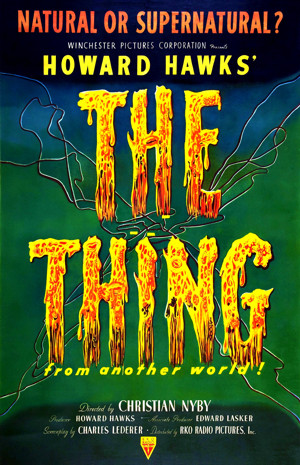
"The Thing" may look like Frankenstein in a jump suit but in fact he turns out to be more vegetable than animal, which is fine. And he turns out to live on blood, so he's a carnivorous plant, which is also fine. But human blood (or blood from any non-whatever-planet-The-Thing-is-from life form) should have been fatal. Every form of life on Earth is based on DNA. Life that evolves elsewhere will have its own unique chemical base so our proteins would be unknown to their biochemistry (and thus probably poison) and vice versa. True, this movie was made two years before Crick and Watson discovered DNA, but ignorance of the law is no excuse! BIOGRAPHY: Francis Harry Compton Crick BIOGRAPHY: James Watson |
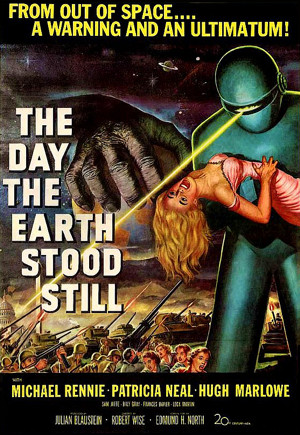 THE DAY THE EARTH STOOD STILL - 1951 THE DAY THE EARTH STOOD STILL - 1951EUREKA! But given these clues his homeworld could only be Mars or Venus. Keep in mind this is 1951, before we knew just how thin Mars' atmosphere was and back when we still thought Venus was a humid, cloud covered jungle world instead of the sulphuric acid cloud inferno that it is. The movie sort of acknowledges this because when Klaatu leaves the hospital we briefly see the newspaper headline: "Martian Escapes!" |
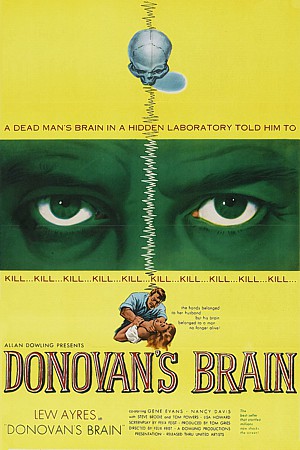 DONOVAN'S BRAIN - 1953 DONOVAN'S BRAIN - 1953
The science, even for the early 50's, was fine up until Cory mentions voodoo - I mean telepathy - as though it were a perfectly natural connection. Aside from that the concept here is actually sound. In fact, I'll make a prediction: Within the next thirty years it will become normal procedure in emergency rooms that if a body (which is just a life support system and mobility unit for a brain) becomes damaged beyond repair, the brain will be removed and kept alive until a new body can be grown. |
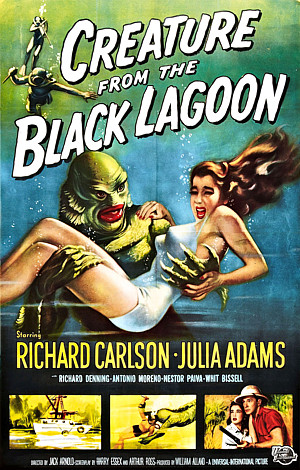 THE CREATURE FROM THE BLACK LAGOON - 1954 THE CREATURE FROM THE BLACK LAGOON - 1954Okay, a water-dwelling humanoid isn't impossible (Read THE AQUATIC APE by Elaine Morgan). I'd be willing to buy that a branch of primates ended up living in the water. The species clearly wasn't very successful, barely managing to avoid extinction, but they survived. Which brings us to the first problem: "they". In other words, there'd have to be a breeding population of these creatures. The movie isn’t entirely clear on this, but they certainly imply that the Creature is unique – the last of his kind. But the big problem is the whole "gill-man" thing. Reverting from lungs to gills is really, really unlikely. Land mammals have returned to the sea before (dolphins, otters, seals, etc.) but they ALL still have lungs. I guess making him look like a big otter instead of a fish wouldn't have been as scary. |
 GOJIRA - 1954 GOJIRA - 1954
The weapon that could destroy Gojira is Dr. Serizawa's Oxygen Destroyer. A weapon of mass destruction so fearsome that Serizawa is afraid to use it because world leaders, once they have knowledge of this weapon, would use it against people. But just how bad can an Oxygen Destroyer be? Serizawa claims that his invention splits Oxygen into fluid. Let's be forgiving of the writers and pretend that Serizawa may have been trying to speak in layman's terms for his betrothed, Emiko, because that explanation doesn't make any sense. But the demonstration of what the weapon is, can't be denied. It instantly removes the oxygen from the water and then, before the fish even have a chance to asphyxiate, it vaporizes the flesh from their bones, and then evaporates their bones. How can a mere Oxygen Destroyer do all that? Consider that fish can be as much as 99.8% water (jellyfish for example). Consider that an animal like Gojira, who survives just nicely in water or on land, could be as much as 60% water, like humans. And that figure is not an entirely accurate statement. For example, Continued at GODZILLA: THE SCIENCE MOMENT. |
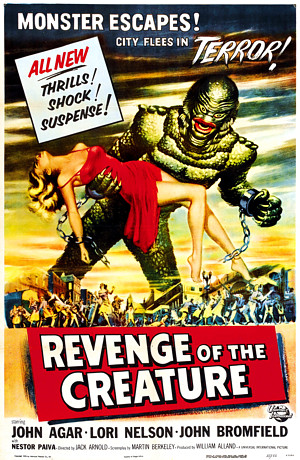 REVENGE OF THE CREATURE - 1955 REVENGE OF THE CREATURE - 1955
I actually have to say one good thing about this movie. They make it clear that the gill-man (sounds Jewish, doesn't it? I'm Murray Gillman, from Manhattan) is more like a lung-fish, which explains why he mostly breathes underwater, but can breathe air for short periods if he has to. |
 THE CREATURE WALKS AMONG US - 1956 THE CREATURE WALKS AMONG US - 1956
Ah, the 50's. So innocent. We still thought Mars and Venus might be, maybe, kind of Earth-like. We thought Mars had thin air, like the Himalayas (it's actually more than 500 times thinner) and that all the clouds the telescopes showed on Venus just meant it was warm and humid, like Houston (instead it's 800 degrees in the shade and the clouds are made of sulfuric acid, like Phoenix). My point is that it's mildly believable that people in the 50's could think you'd be able to adapt to other worlds after some minor surgery, which was Dr. Barton's plan. |
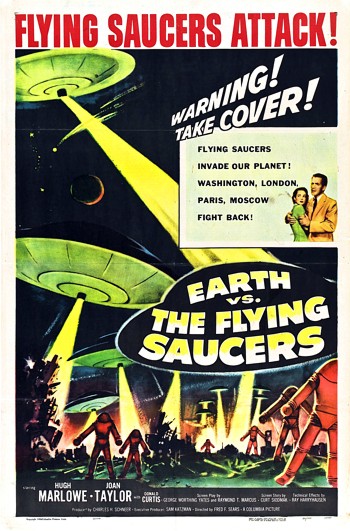
This movie has lots of scientific sounding jargon and most of it is used incorrectly like you'd expect. For example the aliens tell their human captive that their ships use a powerful magnetic field to overcome Earth's gravity. That's not as impressive as it sounds. Consider that if I use a refrigerator magnet to pick up a needle then the magnet is overcoming the gravity of the entire mass of the Earth, which is pulling the needle the other way. Magnetism is a much stronger force than gravity. Most of the science mistakes are minor quibbles like that. The only big one is how the aliens "stop time" on board their ships so your watch stops ticking AND your heart stops beating. But you keep breathing and talking and moving around with a stopped heart. That's quite a trick. |
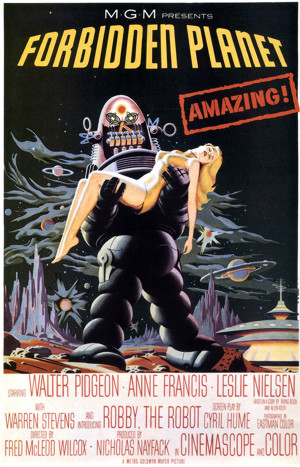 FORBIDDEN PLANET - 1956 FORBIDDEN PLANET - 1956
The opening narration (have I mentioned that I hate narration?) tells us that the space age begins when man reaches the moon in the final decade of the 21st century. This movie was released in 1956, just thirteen years before we reached the moon and five years before Yuri Gagarin became the first man in space. As always, science fiction is rarely too imaginative. More often, it's not imaginative enough. |
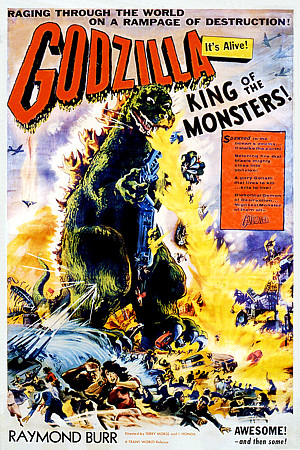 GODZILLA - (U.S. Version) 1956 GODZILLA - (U.S. Version) 1956
Once Godzilla shows himself the movie scientists place him as a Jurassic creature that has somehow survived to modern times. They mention the Jurassic as being 2 million years ago, which isn't even close. The Jurassic Era (the middle portion of the Mesozoic Eon) was from 144 million to 208 million years ago. The trilobite that was apparently living between Godzilla's toes is even more of an anachronism. They became extinct 300 million years ago, before there was any such thing as dinosaurs. Which is all minor quibbling compared to the fact that Godzilla is supposed to be 400 freaking feet tall and breathe radioactive fire. Unprecedented in nature doesn't begin to describe it. But that's okay with me. As I've mentioned elsewhere (see my review of GODZILLA [1998] vs. GODZILLA 2000) Godzilla is plain and simple inexplicable. He just is. Continued at GODZILLA: THE SCIENCE MOMENT. |
 INVASION OF THE BODY SNATCHERS - 1956 INVASION OF THE BODY SNATCHERS - 1956
There's no science objection to anything happening here (although a scientist from the 50's would have disagreed). The only comment I'll make is that the pods, just like the Alien in ALIEN, could never have evolved on their own. They must have been created as a biological weapon by some very advanced technology, giving them the ability to adapt themselves to any sentient beings they come across. |
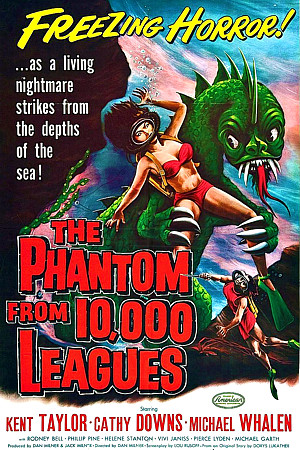 THE PHANTOM FROM 10,000 LEAGUES - 1956 THE PHANTOM FROM 10,000 LEAGUES - 1956
The "Phantom" is only shown in water less than 30 feet deep, not 10,000 leagues. That's a long way, in case you failed seamanship. A league is 3 statute miles so 10,000 leagues equals thirty thousand miles! That's almost four times the diameter of the Earth. Presumably they were thinking of fathoms but a fathom is 6 feet so 10,000 fathoms is just over 11 miles and no part of the ocean is anywhere near that deep. |
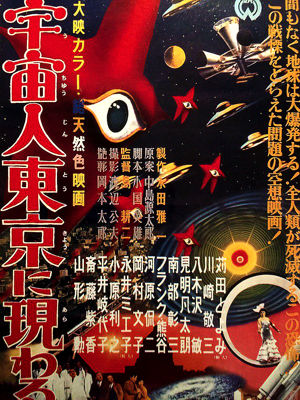
WARNING FROM SPACE wants to take itself seriously, but even for its time, much of the science was wonky. Here's a small example: The blast from this volcano is equal to a, like, really big volcano blast! That is, until we dropped a few Atomic bombs that were more powerful than any weapons we'd ever known. After the world's knowledge of the destructive force of nuclear bombs, natural disasters were described at X times as powerful as the bomb dropped on Hiroshima. Common people felt they could connect with that. The May 18, 1980 eruption of Mount Saint Helens eruption? The destructive force (not counting radiation of course) is described as equal to 25,000 atomic bombs.1 Or about half the power of the Tsar Bomba RDS-220 (РДС-220), which was tested in 1961 (creating one of the largest craters on earth and scaring the crap out of the Soviets. Geographically speaking, the U.S. is too close to the former USSR to Tsar bomb it). 2 Now compare the Tsar, at 50 megatons, to the Little Boy, at 15 kilotons. All the nuclear nations combined in 1956 had nowhere near that many bombs. So no, the movie scientists should have known their nukes had no ability to destroy an approaching earth-sized planet and the far more advanced Pairans shouldn't have brought it up. Want to know more? Damn right you do! 1 Mount St. Helens, Forty Years Later: How NOAA Monitors Volcanoes From Earth Orbit |
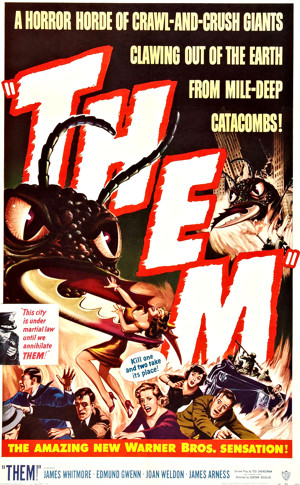 THEM - 1957 THEM - 1957Living things are built for their size. Just making something bigger usually doesn't work. For example, the 50 foot woman in Attack of the 50 Foot Woman. If you take a 5 foot tall woman who weighs 100 lbs and somehow make her ten times her size, how much will she weigh? 1000 lbs? No, because weight is a function of volume, which increases as the cube increases (this is the square-cube law). Thus if you're ten times bigger, you have 10³ or 1000 times the volume, so she now weighs 100,000 lbs (50 tons!). But how much stress your bones can stand is a function of their cross-sectional area, which increases as the square. So her bones are 100 times stronger but she weighs 1000 times as much, 10 times more than her bones can stand. She crumbles. That's just one example - and only the beginnings of her problems, or the problems of ants made 250 times bigger than normal. |
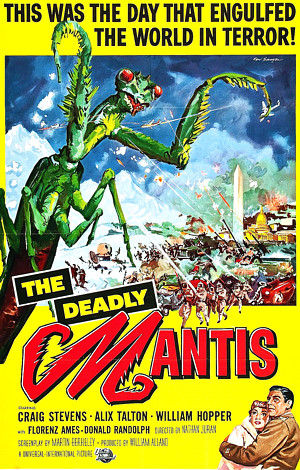 THE DEADLY MANTIS - 1957 THE DEADLY MANTIS - 1957
The only truly bad science, seen here and in many other films, is the idea that any living thing could be frozen in ice and survive. There’s lots of water in the cells of your body and if you or any other animal was frozen solid all that water becomes ice crystals. Jagged, razor sharp ice crystals, which reduce your cells to metabolic mush.There are a few animals that can survive such conditions because they have anti-freeze-like enzymes in their system that prevent ice-crystals from forming. But since the Mantis in the movie immediately heads for the tropics it’s clear that it didn’t live in an environment where being frozen was something to worry about. |
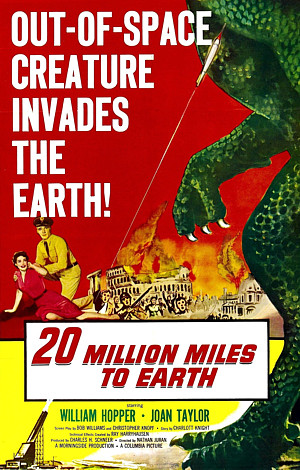 20 MILLION MILES TO EARTH - 1957 20 MILLION MILES TO EARTH - 1957
I can say one good thing and one bad thing about the science here. First, the way Venus is described (but never shown) here is perfectly accurate for 1957. After nearly a century of study using the best telescopes and scientific minds available, it had been determined that Venus was a rain forest version of Earth, hot and humid and perpetually shrouded in clouds. Images of jungles and mists and endless rain seemed about right. Then NASA launched the first interplanetary space probe, Mariner 2 (Mariner 1 had a launch failure) in 1962. In one brief fly-by everything we thought we knew about Venus was shown to be wrong. It wasn't hot and humid, it was hot enough to melt lead and bone dry. The clouds are mostly sulfuric acid, the atmosphere almost entirely carbon dioxide and the air pressure at the surface is 80 times greater than on Earth. Oh, and no lizard men. Astronomers can do a lot but you really never know about a place until you go there. The bad science was the Pentagon's stated interest in capturing the creature alive so they can find out why it could breathe the atmosphere of Venus and the astronauts couldn't. I'm just guessing but maybe it's because the creature evolved on Venus and the astronauts didn't. |
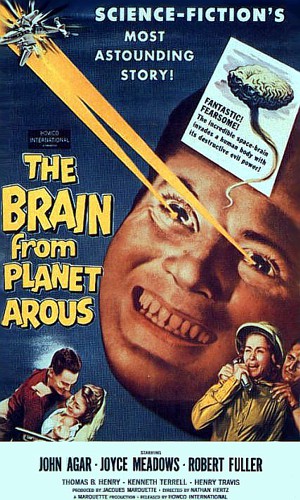 THE BRAIN FROM PLANET AROUS - 1957 THE BRAIN FROM PLANET AROUS - 1957
If you detected bursts of gamma rays from 30 miles away, the last thing you'd want to do is hop in a jeep for a closer look. Gamma rays are dangerous and the closer you got to the source the stronger they’d be. You'd think nuclear scientists would know that. |
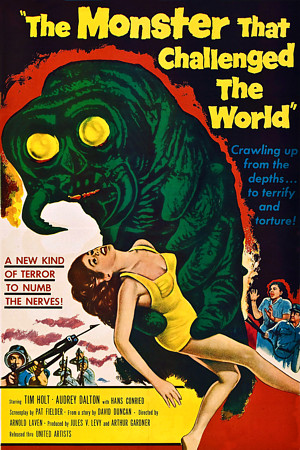 THE MONSTER THAT CHALLENGED THE WORLD - 1957 THE MONSTER THAT CHALLENGED THE WORLD - 1957
EUREKA! Rogers thinks that a recent earthquake MIGHT have broke the mud covering of the dry and ancient eggs, exposing them to the water of the Salton Sea (no evil atomic bombs!). The east side of the Salton Sea has a very active area of seismic activity even now, where bubbling volcanic mud-pots fart carbon dioxide and methane day and night. Continued at THE SCIENCE MOMENT/THE MONSTER THAT CHALLENGED THE WORLD |
 THE FLY - 1958 THE FLY - 1958
The idea of teleportation has been a favorite of sci-fi forever, right up there with warp drive, but the details have always been glossed over and this is no exception. I'm sure you've heard of "E = mc2" ? This famous Einstein equation tells you how much energy you get when you convert matter into energy. "E" is energy, "m" is mass and "c" is the speed of light. If we use metric units, a full grown man masses about 85 kilograms. The speed of light is pretty close to 300,000 kilometers / second or 3 X 108 meters / second so plugging these numbers in gives us an energy of 7.65 x 1018 kg-m2/sec2 or 7.65 x 1018 Joules. In case that means nothing to you, it's equivalent to 1800 megatons of TNT (about 90 good, old-fashioned H-bombs). Not exactly the kind of experiment you want your husband doing in the basement. Read the !!!SCIENCE MOMENT!!! on the full THE FLY franchise: THE FLY SCIENCE MOMENTS |
 RETURN OF THE FLY - 1958 RETURN OF THE FLY - 1958
Teleportation, even as described in a bad movie like this, isn't quite impossible. But let's consider the technique: This device works by scanning you and recording the position of every particle in your body, disintegrating you and sending you and your data to the receiver, which reassembles you. So for each atom in your body you need three numbers (x,y,z) to indicate location, plus another number to indicate what kind of atom it is and maybe one more to indicate the atom's state (ionized, etc.). All these numbers represent about 20 bytes (in computerese) of information. Take that times the number of particles in your body (something in the neighborhood of 3 x 1027 atoms) and you get 6 x 1019 gigabytes of information storage required each time. A good, top of the line computer (for March, 2000 -feo.) comes with a hard drive that can store about 20 gigabytes. You'd need 2.8 x 1018 computers (enough for every person on Earth to have more than 465 million computers each). Think of the download time! Each transmission would take so long it'd be quicker to walk. Continued at the !!!SCIENCE MOMENT!!! on the full THE FLY franchise: THE FLY SCIENCE MOMENTS |
 THE CURSE OF THE FLY - 1959 THE CURSE OF THE FLY - 1959
Eventually (due to passport problems) Henri must teleport back to Montreal. When you talk about teleporting someone from London to Montreal, you have to worry about momentum: Conservation of momentum, that is. At the equator the earth is spinning at almost half a kilometer per second. The farther north you go the lower the velocity but the real problem is that London and Montreal are at different latitudes and therefore moving at different velocities. The difference looks small on a map but in fact it works out to about 130 km kilometers per hour or roughly 80 mph. That means Henri would appear in the Montreal booth and immediately splat against the glass. Continued at the !!!SCIENCE MOMENT!!! on the full THE FLY franchise: THE FLY SCIENCE MOMENTS |
 THE HIDEOUS SUN DEMON - 1959 THE HIDEOUS SUN DEMON - 1959
This movie was made in 1959, shortly after the launch of the first U.S. satellite (Explorer 1 on January 31st, 1958). This satellite discovered the Van Allen radiation belts, regions of trapped solar and cosmic particles in the Earth's magnetic field and this discovery may be what inspired the "new radiation from space" idea in this film, which is kind of cool. What's not cool is the idea of running evolution "backwards", an idea that pops up in bad sci-fi (and one of the worst Star Trek: Next Generation episodes) all the time. This idea comes from the misconception that evolution is a form of progress, leading ultimately to us, of course. It is not. Evolution is a means of adapting to an environment and if becoming less intelligent represented a better adaptation than becoming more so, then that's what would happen. Evolution is blind and has no direction. Furthermore, reptiles are not "less evolved" than we are. They're just as modern as humans – but on a different branch. |
 ON THE BEACH - 1959 ON THE BEACH - 1959
The short answer is no. Even if WWIII had happened in the 80's (before the Soviet attempt to match our Star Wars spending caused their collapse), the resulting fallout from a massive exchange (with thousands more nukes than they had in the 60's) would not have rendered the entire world uninhabitable as portrayed in the movie. Fallout is radioactive dust created from debris sucked up into the mushroom cloud of a nuclear explosion that gradually “falls out” of the atmosphere, covering the ground like deadly snow. Airbursts (nukes detonated in the air above their targets) produce almost no fallout. And just how deadly fallout is depends on the radioactive isotopes they contain are. Even for an all out nuclear exchange, it would be possible to survive in a basement shelter as long as you had 3 or 4 months of supplies (that sounds like a lot but if it was mostly dehydrated food it really wouldn't take up much room). After that the fallout would have decayed enough that it'd be safe to go outside again. So given that people in Australia had 5 months or more to prepare it would have been perfectly possible to survive. But there is one other scenario. Continued at SCIENCE MOMENT/OnTheBeach |
| FEO AMANTE'S HORROR THRILLER Created by: E.C.McMullen Jr. COME FOLLOW ME @ |
| Amazon |
| ECMJr |
| Feo Blog |
| IMDb |
| Stage32 |
| Twitter X |
| YouTube |
| Zazzle Shop |
Links To The FUTURE! MAN
CONQUERS SPACE BUZZ ALDRIN SCIENCE LINKS! BAD ASTRONOMY CENTER FOR THE STUDY OF SCIENCE FICTION JUNK SCIENCE MADSCI.org LINKS TO THE PAST! NASA.gov |




